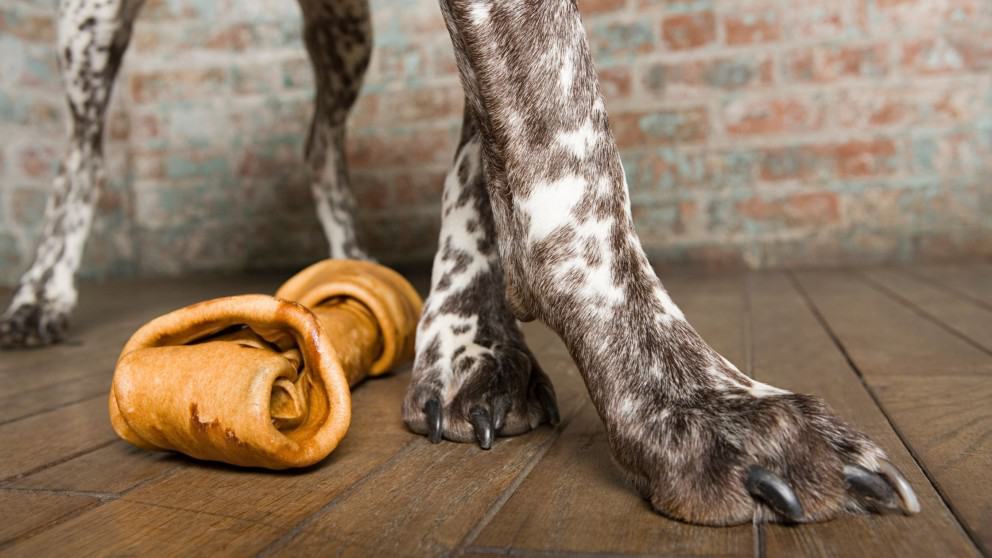Why is My Dog Chewing on his Paws?

Are you beginning to see your beloved pet starting to chew his or her paws lately? This may be more than just your dog trying to scratch an itch. Now this is no reason to panic right away and does not necessarily mean that you should rush immediately to your local vet, but if this behavior lasts for extended periods of time or comes on suddenly, this could be a cause for concern. If your dog is experiencing extreme redness, swelling, foul odor, bleeding, limping or other signs of pain and infection, call your vet immediately.
Below we will go into further detail about the root causes for paw chewing.
- Seasonal allergies
- Low quality food
- Harsh environments
- Parasites
- Stress and anxiety
Before getting into some of the most common causes for paw chewing, it is good to know the difference between chewing and licking. The bottom line is that licking tends to feel good to the dog. This act may be soothing to a painful spot, but if not careful could lead to a bad habit of licking long after the paw has healed. Your dog’s saliva actually contains certain antibacterial chemicals. So, when your dog licks his or her wounds they may actually be cleansing to promote the healing of a wound. Despite this, if your dog starts to actively chew instead of lick at a wound this would start to be a cause for concern.
Seasonal allergies
One of the most common reasons dogs chew their paws is allergies. Just like us, dogs can develop allergies with the changing of seasons; the difference being, they tend to put their feet in their mouth. Pollen, mold, and mildew all might be triggers for this chewing to take place. These allergens cause his paws to be irritated thus the chewing to occur. This chewing is a soothing for your pet and feels good to the dog. Your vet may recommend a mild antihistamine to ease the symptoms.
Low quality food
While short-term chewing is typically due seasonal allergies, more long-term chewing could be a sign of a food allergy. This is where discovering the root of the problem becomes more complex. The process of determining the exact food ingredient that is triggering the problem can be a time consuming one. Despite this being a difficult process to find the specific ingredient there are processes that have had some success.
The best way to diagnose a food allergy is to work with your vet. They can help you discover which ingredients are causing the symptoms through an allergy test or a food elimination trial. One of the most successful ways to figure out which ingredient is causing your dog allergies is with a 12-week food elimination trial. This trial begins by feeding your dog a stripped-down diet and gradually reintroducing specific ingredients back into the diet week to week. During this trial the dog is monitored to see at what time this chewing behavior flairs up to determine the troublesome food ingredient. If this something you feel is right for your dog, consult with your trusted veterinarian.
Harsh environments
Another possible reason dogs will chew their paws is environmental irritants. For example, during the winter months or in arid climates dogs may experience dry skin, similar to us. When dogs experience this they may tend to relive the itchy, dry skin by licking or even chewing on themselves.
Parasites
Parasites including fleas, ticks, and mites can also cause itchy sensations in your dog’s paws which he or she will address by licking or chewing at them. This may go unnoticed due to the small size of these parasites so be sure to throughly check your dog’s skin and fur especially after hiking or walking through wooded areas. If you feel parasites may be causing the problem, talk to your vet about a regular flea and tick treatment.
Stress and anxiety
Lastly, another environmental cause could be a phycological one. Dogs will over-groom themselves when they feel anxious, lonely, depressed, or even bored. This tends to happen when pets are home alone without their owners for long periods of time. Dogs that have experienced abuse or neglect in the past tend to experience stress and anxiety the most. A way to help with this issue includes maintaining a strict daily routine, increasing your dog’s daily exercise, and asking a friend or hiring a dog walker to break up the periods your dog is home alone.
Final Thoughts
Overall, dogs will always lick themselves and in fact it would actually be unusual if they never did. Remember if your dog starts a new paw chewing habit or chews on his paws for a long period of time, these could be signs of an underlying cause. When in doubt, contact your trusted veterinarian for professional advice. To lessen the cost of those vet visits, make sure you have the right insurance for your pup.
How often should you be taking your pet to the vet? Read more here.
